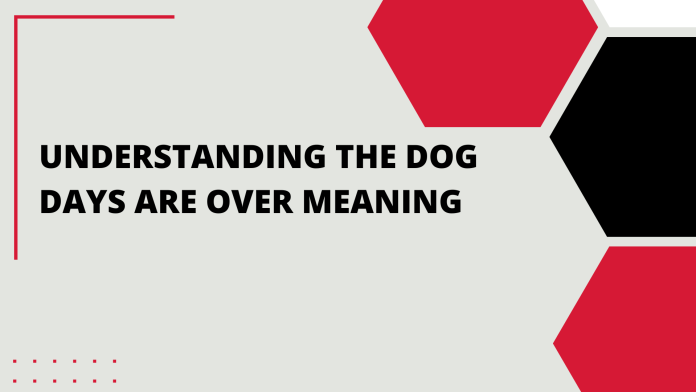In the realm of idioms and expressions, the phrase “dog days are over meaning” may seem a tad perplexing. It’s not a literal reference to the conclusion of a dog’s particular period. Instead, it carries a metaphorical weight, one that has found its way into everyday conversations. In this article, we’ll explore the meaning behind this peculiar saying and delve into its origins.
Unveiling the Mystery: What Does “Dog Days Are Over” Mean?
The Transition from Difficulty to Relief
The phrase “dog days are over” is often used to signify the end of a challenging or arduous period in someone’s life. It’s akin to saying that the difficult times have passed, and better days are ahead. This idiomatic expression conveys a sense of relief, optimism, and the anticipation of brighter moments.
Ancient Astronomical Roots
To truly grasp the origins of this phrase, we must journey back to ancient times. The term “dog days” finds its roots in the field of astronomy. The ancient Egyptians, for instance, associated the “dog days” with the rising of Sirius, the Dog Star, in the summer sky. They believed that this celestial event was responsible for the intense heat and discomfort during the summer months.
The Sirius Connection
The Dog Star, Sirius, is the brightest star in the Canis Major constellation, often referred to as the “Big Dog.” Its appearance in the night sky coincided with the peak of summer, bringing with it scorching temperatures. The association between Sirius and the hottest period of the year gave birth to the concept of “dog days.”
The Hounds of Heat
The term “dog days” doesn’t only have astronomical significance; it’s also rooted in the belief that the excessive heat during this time of year could cause madness in dogs. This notion has persisted through history and is reflected in various cultures’ folklore.
Cultural References and Usage
In Literature and Music
The phrase “dog days are over” has found its way into literature and music. It is often used to mark a turning point in a story or song, signifying a shift from despair to hope. Artists and writers employ it to evoke a sense of transformation and renewal.
Pop Culture
In popular culture, “dog days are over” has become a symbol of resilience and the human spirit’s ability to overcome adversity. It’s a reminder that, no matter how challenging the journey, better days are on the horizon.
Everyday Conversation
This idiom is not confined to books and songs; it’s part of everyday conversation. People use it to encourage others during difficult times or to celebrate personal victories.
Conclusion
In the world of idiomatic expressions, “dog days are over” stands as a symbol of hope and optimism. Its roots in astronomy and the belief in the power of celestial events to influence our lives make it a fascinating phrase. So, the next time you hear someone say, “the dog days are over,” you’ll know that they’re not talking about our four-legged friends but rather signaling a positive change on the horizon.
FAQs
1. Is “dog days are over” a widely recognized phrase?
- Yes, it is a common idiom used to signify the end of a difficult period.
2. Are the “dog days” related to dogs in any way?
- The term has historical ties to the belief that excessive heat during this time could affect dogs, but it’s mostly used metaphorically today.
3. Can you provide an example of how to use this phrase in a sentence?
- Certainly! “After months of hard work, John finally got his dream job, and he felt like the dog days were over.”
4. Are there any variations of this idiom in other languages?
- Yes, many languages have similar idiomatic expressions to convey the end of a challenging period.
5. How can I incorporate “dog days are over” into my everyday conversations?
- You can use it when discussing personal achievements or to encourage someone who is going through a tough time.
In conclusion, “dog days are over” is more than just a catchy phrase; it encapsulates the universal human experience of enduring hardship and looking forward to brighter days ahead. So, embrace the optimism it carries and remember that, no matter the challenges you face, the dog days will eventually be over.

